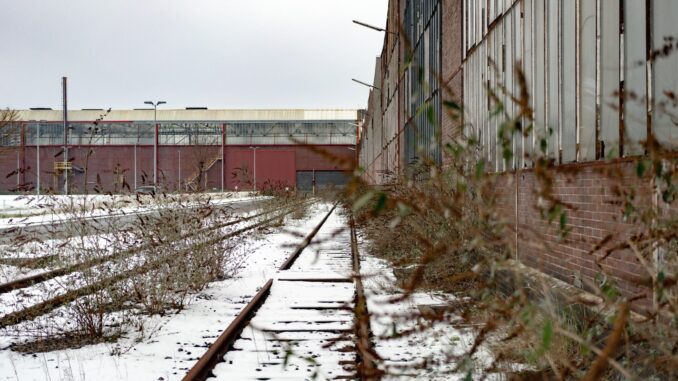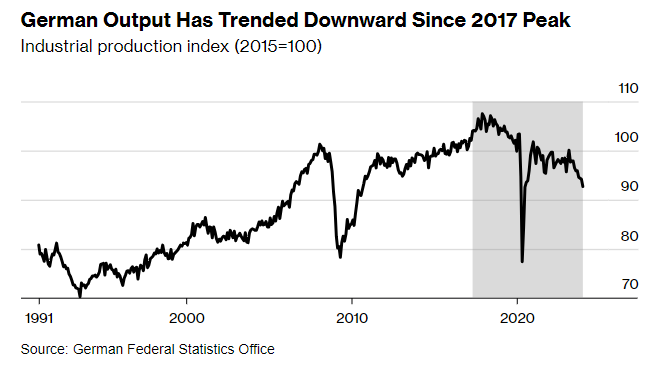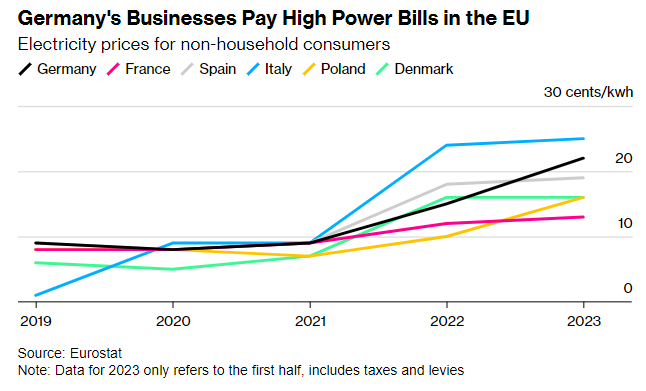
Amid the flickering of flares and torches, many of the 1,600 people losing their jobs stood stone-faced as the glowing metal of the plant’s last product — a steel pipe — was smoothed to a perfect cylinder on a rolling mill. The ceremony ended a 124-year run that began in the heyday of German industrialization and weathered two world wars, but couldn’t survive the aftermath of the energy crisis.
There have been numerous iterations of such finales over the past year, underscoring the painful reality facing Germany: its days as an industrial superpower may be coming to an end. Manufacturing output in Europe’s biggest economy has been trending downward since 2017, and the decline is accelerating as competitiveness erodes.
“There’s not a lot of hope, if I’m honest,” said Stefan Klebert, chief executive officer of GEA Group AG — a supplier of manufacturing machinery that traces its roots to the late 1800s. “I am really uncertain that we can halt this trend. Many things would have to change very quickly.”
The underpinnings of Germany’s industrial machine have fallen like dominoes. The US is drifting away from Europe and is seeking to compete with its transatlantic allies for climate investment. China is becoming a bigger rival and is no longer an insatiable buyer of German goods. The final blow for some heavy manufacturers was the end of huge volumes of cheap Russian natural gas.

Alongside global volatility, political paralysis in Berlin is intensifying long-standing domestic issues such as creaking infrastructure, an aging workforce and the snarl of red tape. The education system, once a strength, is emblematic of a long-term lack of investment in public services. The Ifo research institute estimates that declining math skills will cost the economy about €14 trillion ($15 trillion) in output by the end of the century.
In some cases, the industrial downshift is taking place in small steps like scaling back expansion and investment plans. Others are more evident like shifting production lines and trimming staff. In extreme instances — like Vallourec SACA’s pipe plant, once part of fallen industrial giant Mannesmann — the consequence is permanent closure.

Wolfgang Freitag at the site of the Vallourec plant in Düsseldorf on Jan. 19Photographer: Ben Kilb/Bloomberg
“The shock was huge,” said Wolfgang Freitag, who worked at the plant since he was a teenager. The 59-year-old’s job now is to disassemble equipment for sale and help his old colleagues find new work.
Germany still has an enviable roster of small, agile manufacturers, and the Bundesbank and others reject the notion that full-blown deindustrialization is anywhere close. But with reforms stalled, it’s unclear what will slow the decline.
“We are no longer competitive,” Finance Minister Christian Lindner said at a Bloomberg event earlier this month. “We are getting poorer because we have no growth. We are falling behind.”
Chancellor Olaf Scholz’s fractious coalition was thrown into further disarray in mid-November by a budget crisis sparked by a court ruling over borrowing measures, leaving the government with little leeway to invest.
“You don’t have to be a pessimist to say that what we’re doing at the moment won’t be enough,” said Volker Treier, foreign trade chief at Germany’s Chambers of Commerce and Industry. “The speed of structural change is dizzying.”
Frustration is widespread. Although hundreds of thousands of people have hit the streets in recent weeks to protest against far-right extremism, the anti-immigration Alternative für Deutschland, or AfD, is ahead of all three ruling parties in the polls — trailing only the conservative bloc. Scholz’s Social Democrat-led alliance has support from 34% of voters, according to a Spiegel analysis of recent surveys.
Fading industrial competitiveness threatens to plunge Germany into a downward spiral, according to Maria Röttger, head of northern Europe for Michelin. The French tiremaker is shutting two of its German plants and downsizing a third by the end of 2025 in a move that will affect more than 1,500 workers. US rival Goodyear has similar plans for two facilities.
“Despite the motivation of our employees, we have arrived at a point where we can’t export truck tires from Germany at competitive prices,” she said in an interview. “If Germany can’t export competitively in the international context, the country loses one of its biggest strengths.”
Other examples of decline surface regularly. GEA is closing a pump factory near Mainz in favor of a newer site in Poland. Auto-parts maker Continental AG announced plans in July to abandon a plant that makes components for safety and brake systems. Rival Robert Bosch GmbH is in the process of slashing thousands of workers.
The energy crisis in the summer of 2022 was a major catalyst. While worst-case scenarios like freezing homes and rationing were avoided, prices remain higher than in other economies, which adds to costs from higher wages and regulatory complexity.

One of the hardest-hit sectors has been chemicals — a direct result of Germany’s loss of cheap Russian gas. With the transition to clean hydrogen still uncertain, nearly one in 10 companies are planning to permanently halt production processes, according to a recent survey by the VCI industry association. BASF SE, Europe’s biggest chemical producer, is cutting 2,600 jobs and Lanxess AG is reducing staff by 7%.
Germany’s sluggish bureaucracy also isn’t keeping pace, even when companies are prepared to invest. GEA installed solar capacity at a factory in the western German town of Oelde, where it makes equipment that can separate cream from milk. It applied for permits to feed in the power last January, two months before starting construction and is still waiting for approval — nearly two years after initiating the project.

The energy squeeze came quickly on the heels of disruptions from the pandemic that led to stalled assembly lines as German automakers waited months for chips and other components, underscoring the risks of relying on a far-flung network of suppliers, especially in Asia.
Germany’s headwinds require adaptation. For EBM-Papst, a producer of fans and ventilators, the industrial crisis meant acquiring a struggling supplier. And to stay nimble, the company shifted production to components for heat pumps and data centers and away from the auto sector. It’s also looking to move some administrative tasks to eastern Europe or India.
“It’s not just energy,” CEO Klaus Geißdörfer said in an interview. “It’s also staff availability in Germany, which is now very tense.” Within a decade, the working-age population will be too small to keep the economy functioning as it does today, he added.

The Bundesbank concluded in a September report that a decline in manufacturing — which accounts for just under 20% of the economy, nearly twice the US’s level — isn’t worrying if it’s gradual.
Such a trend could mean the end of the road for more basic manufacturers like the pipe plant in Düsseldorf. Freitag, a member of the factory’s works council, is now helping prepare the 90-hectare site for sale. Much of the equipment will end up in a scrapyard, which “makes my heart and eyes weep,” he said.



